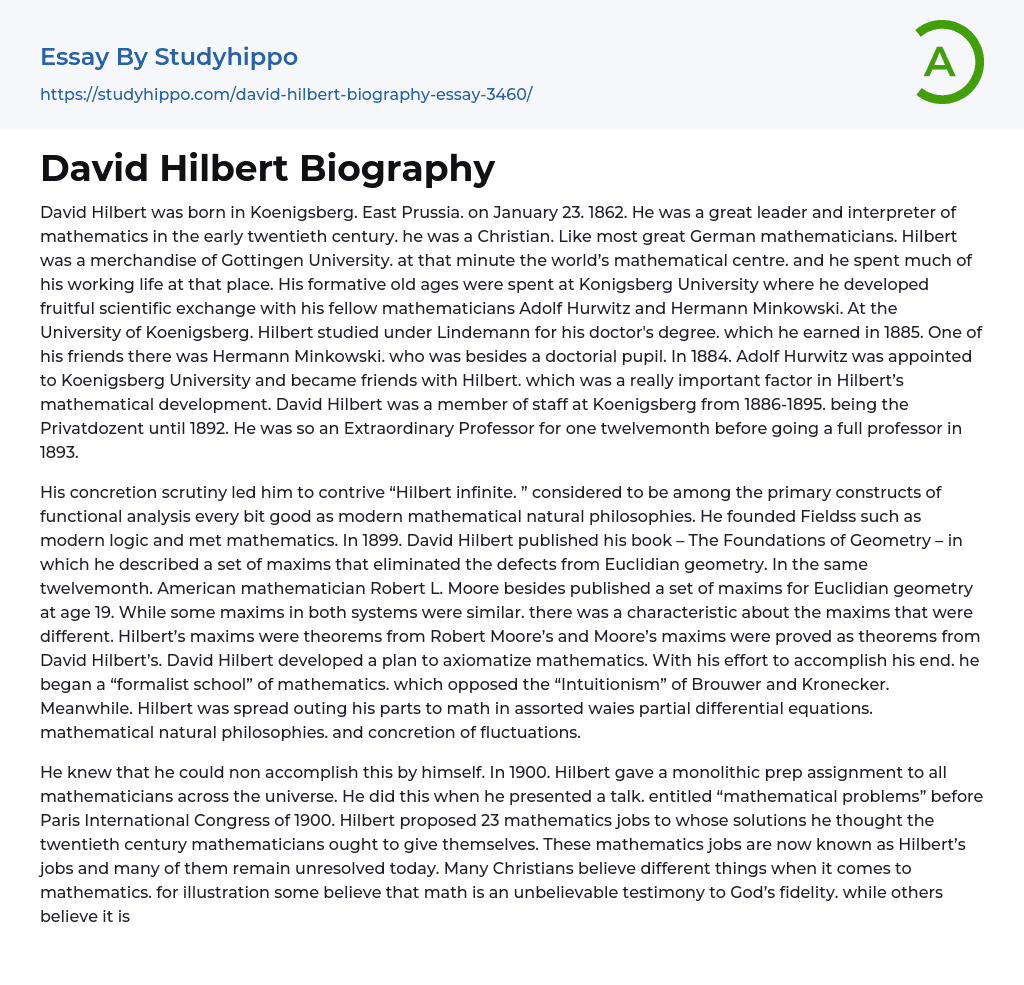David Hilbert was born in Koenigsberg. East Prussia. on January 23. 1862. He was a great leader and interpreter of mathematics in the early twentieth century. he was a Christian. Like most great German mathematicians. Hilbert was a merchandise of Gottingen University. at that minute the world’s mathematical centre. and he spent much of his working life at that place. His formative old ages were spent at Konigsberg University where he developed fruitful scientific exchange with his fellow mathematicians Adolf Hurwitz and Hermann Minkowski. At the University of Koenigsberg. Hilbert studied under Lindemann for his doctor's degree. which he earned in 1885. One of his friends there was Hermann Minkowski. who was besides a doctorial pupil. In 1884. Adolf Hurwitz was appointed to Koenigsberg University and became friends with Hilbert. which was a really important factor in Hilbert
...’s mathematical development. David Hilbert was a member of staff at Koenigsberg from 1886-1895. being the Privatdozent until 1892. He was so an Extraordinary Professor for one twelvemonth before going a full professor in 1893.
His concretion scrutiny led him to contrive “Hilbert infinite. ” considered to be among the primary constructs of functional analysis every bit good as modern mathematical natural philosophies. He founded Fieldss such as modern logic and met mathematics. In 1899. David Hilbert published his book – The Foundations of Geometry – in which he described a set of maxims that eliminated the defects from Euclidian geometry. In the same twelvemonth. American mathematician Robert L. Moore besides published a set of maxims for Euclidian geometry at age 19. While some maxims in both systems were similar. there was a characteristic about the maxims that were
different. Hilbert’s maxims were theorems from Robert Moore’s and Moore’s maxims were proved as theorems from David Hilbert’s. David Hilbert developed a plan to axiomatize mathematics. With his effort to accomplish his end. he began a “formalist school” of mathematics. which opposed the “Intuitionism” of Brouwer and Kronecker. Meanwhile. Hilbert was spread outing his parts to math in assorted waies partial differential equations. mathematical natural philosophies. and concretion of fluctuations.
He knew that he could non accomplish this by himself. In 1900. Hilbert gave a monolithic prep assignment to all mathematicians across the universe. He did this when he presented a talk. entitled “mathematical problems” before Paris International Congress of 1900. Hilbert proposed 23 mathematics jobs to whose solutions he thought the twentieth century mathematicians ought to give themselves. These mathematics jobs are now known as Hilbert’s jobs and many of them remain unresolved today. Many Christians believe different things when it comes to mathematics. for illustration some believe that math is an unbelievable testimony to God’s fidelity. while others believe it is anti-Christian. I can assist others connected by raising consciousness of the different beliefs. This is of import to us as Christians because it opens our eyes to world and how we should look at things through a Christian point of view.
- Correlation essays
- Price Elasticity Of Demand essays
- Algebra essays
- Arithmetic essays
- Statistics essays
- Measurement essays
- Geometry essays
- Regression Analysis essays
- Derivative essays
- Integral essays
- Mean essays
- Normal Distribution essays
- Probability Theory essays
- Variance essays
- Cycle essays
- Shape essays
- Age Of Enlightenment essays
- Ethos essays
- Time essays
- Acceptance essays
- Meaning Of Life essays
- Reality essays
- Natural Law essays
- Political Philosophy essays
- Utilitarianism essays
- Existence essays
- Free Will essays
- Good And Evil essays
- Confucianism essays
- Relativism essays
- Conscience essays
- Environmentalism essays
- Empiricism essays
- Epistemology essays
- Ethics essays
- Existentialism essays
- Human Nature essays
- Individualism essays
- Metaphysics essays
- Philosophy Of Life essays
- Transcendentalism essays
- Truth essays
- Destiny essays
- Determinism essays
- Fate essays
- Functionalism essays
- Philosophers essays
- Pragmatism essays
- Future essays
- Child Observation essays




